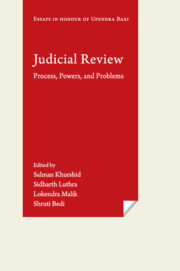8 results
Index
-
- Book:
- Judicial Review
- Published online:
- 23 January 2020
- Print publication:
- 09 April 2020, pp 413-430
-
- Chapter
- Export citation
About the Contributors
-
- Book:
- Judicial Review
- Published online:
- 23 January 2020
- Print publication:
- 09 April 2020, pp 411-412
-
- Chapter
- Export citation
Editors' Note
-
-
- Book:
- Judicial Review
- Published online:
- 23 January 2020
- Print publication:
- 09 April 2020, pp xxiii-xxxii
-
- Chapter
- Export citation
Contents
-
- Book:
- Judicial Review
- Published online:
- 23 January 2020
- Print publication:
- 09 April 2020, pp v-vi
-
- Chapter
- Export citation
Frontmatter
-
- Book:
- Judicial Review
- Published online:
- 23 January 2020
- Print publication:
- 09 April 2020, pp i-iv
-
- Chapter
- Export citation

Judicial Review
- Process, Powers, and Problems (Essays in Honour of Upendra Baxi)
-
- Published online:
- 23 January 2020
- Print publication:
- 09 April 2020
Chapter 65 - Perimenopause
- from Section 8 - Infertility and reproductive endocrinology
-
-
- Book:
- Clinical Gynecology
- Published online:
- 05 April 2015
- Print publication:
- 23 April 2015, pp 1004-1023
-
- Chapter
- Export citation
Contributors
-
-
- Book:
- Clinical Gynecology
- Published online:
- 05 April 2015
- Print publication:
- 23 April 2015, pp viii-xiv
-
- Chapter
- Export citation



